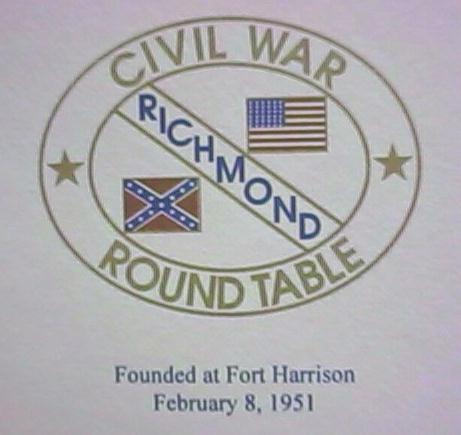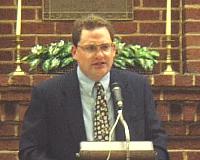


September 2001
Sam Craghead, President Art & Carol Bergeron, Editors 4361F Lakefield Mews 3901 Paces Ferry Road Richmond, VA 23231 Chester, VA 23831-1239 September 2001 PROGRAM Dr. Richard M. McMurry "Thoughts on the Atlanta Campaign" 8:00 p.m., Tuesday, September 11, 2001, at the Boulevard United Methodist Church, 321 N. Boulevard, Richmond, VA (corner of Boulevard and Stuart Ave.) Dr. Richard M. McMurry is an independent scholar currently living in Roanoke, Virginia. He is a native of Georgia and received his bachelor's degree from the Virginia Military Institute. McMurry earned a Ph.D. in American history from Emory University, where he studied under the late Bell I. Wiley. He has taught at North Carolina State University and Valdosta State University in Georgia. McMurry is the author of a number of books. In Two Great Rebel Armies: An Essay in Confederate Military History (Chapel Hill, 1989), he compared and contrasted the Army of Northern Virginia and the Army of Tennessee. McMurry wrote a biography of the youngest full general in the Confederacy, John Bell Hood and the War for Southern Independence (Lincoln, Neb., 1992). He edited Footprints of a Regiment: A Recollection of the 1st Georgia Regulars, 1861-1865 (Atlanta, Ga., 1992) and did a study of VMI graduates, Virginia Military Institute Alumni in the Civil War: In Bello Praesidium (Lynchburg, Va., 1999). His most recent book was Atlanta 1864: Last Chance for the Confederacy (Lincoln, Neb., 2000) in which he examined that campaign's major role in deciding the war's outcome. The Austin, Texas, Civil War Round Table recently awarded McMurry their sixth annual Daniel M. and Marilyn W. Laney Book Prize for this book. He is the author of numerous articles in Civil War journals and magazines and has contributed essays to compilations such as Encyclopedia of Confederate History. In his presentation, McMurry will give an overview of the Atlanta Campaign so that there will be a clear understanding of its overall framework. He will then give some new perspectives on those operations and challenge some common assumptions about them.
Review of the August ProgramChristopher L. Kolakowski presented an informative talk titled "Stars and Stripes on Marye's Heights." The Second Battle of Fredericksburg, as it is sometimes known, found two generals exercising independent command for the first time. Major General John Sedgwick, head of the Sixth Corps of the Army of the Potomac, faced Major General Jubal A. Early, recently given a division of the Army of Northern Virginia. When Major General Joseph Hooker began his flanking movement against General Robert E. Lee's army, he left Sedgwick at Fredericksburg with about 50,000 of his own men and troops from two other corps. Sedgwick received orders to demonstrate against the Confederates on his front and hold their attention while Hooker took some 70,000 toward the Confederate rear. The Federals threw pontoon bridges across the Rappahannock River and made preparations as if they were going to assault the heights as their army had the previous December. Lee learned that Hooker had marched around his flank and had taken up a position at Chancellorsville. He decided to divide his army, taking most of it to face Hooker. Early remained behind with about five brigades and 56 cannon. Sedgwick's operations suffered from a communications lag from Hooker's headquarters. It took about three hours for messages to travel the twenty miles that separated the two parts of the Union army. Finally, on the night of May 2, 1863, the Sixth Corps began its advance against Early's Confederates. On the following morning about 4:30, the Federal attack began. The small force of Southern troops in Fredericksburg had to retreat. Union soldiers looted what little was left in the town as they advanced through it. Brigadier General William Barksdale's Mississippians occupied the famous stone wall atop Marye's Heights, the focus of Sedgwick's assault. The terrain posed a problem for the Federals-a canal or ditch that acted as a moat restricted their movements. They stumbled through ground where the Union dead had been buried in December and found that many bodies had come to the surface as the ground settled. Brigadier General Frank Wheaton's brigade attacked but was repulsed with a loss of about 350 men. Next, portions of Brigadier General John Newton's division cooperated with men of Brigadier General John Gibbon's division of the First Corps and attempted a pincer movement to try to catch Marye's Heights from behind. Artillery fire from the famed Washington Artillery of New Orleans stymied this assault. Here controversy intervened. The Confederates claimed that the Federals raised a flag of truce, while the Union soldiers stated that there was no such flag. During the lull, Union officers were able to study the Confederate line along Marye's Heights and discover just how weak it was. Sedgwick then ordered forward a new assault about 11 a.m. He told the men to go in with their bayonets fixed and to overwhelm the Southern defenders. The Federals were not to fire their weapons and were not to stop until told to do so. Things went wrong from the start. Finally, however, men of Brigadier General Albion Howe's division surged forward on their own initiative and went over the stone wall. They captured several Confederate cannon, hundreds of prisoners, and at least one battle flag. With this success, Sedgwick advanced toward the rear of Lee's army but found himself faced with troops rushed against him directly under Lee's command. Sedgwick was almost surrounded by the Confederates and was forced to retreat back across the Rappahannock.
Announcements
Round Table Raffle The item for this month's raffle is an original Virginia Seal uniform button valued at $100.00.
Museum of the Confederacy Lecture The Museum of the Confederacy announces the 2001 Elizabeth Roller-Bottimore Annual Lecture: "Johnny Reb and GI Joe: A Soldier-Historian's Reflections on Two Wars," on Thursday, September 13, at 7:30 p.m. The lecture will be held at Perkinson Recital Hall, University of Richmond and is free to the public. Dr. Charles P. Roland, a decorated veteran of the Ardennes Campaign, will reflect on his own experiences in World War II as a framework for understanding the realities of soldiering during the Civil War. Dr. Roland will sign books at a reception following the lecture. For more information, call (804) 649-1861. A widely published historian, scholar and educator, some of Dr. Roland's works include Albert Sidney Johnston: Soldier of Three Republics and An American Illiad: The Story of the Civil War. Roland has served as instructor of history in a variety of capacities at a number of leading institutions, including Louisiana State University, Tulane University, United States Military Institute and Army War College, and United States Military Academy. He has held positions in many professional organizations, including president of both the Louisiana and the Southern Historical Associations. He is currently professor emeritus of history at the University of Kentucky and regularly speaks to Civil War roundtables and World War II veterans' organizations.
University of Richmond Class The University of Richmond School of Continuing Studies announces a class titled "Civil War Virginia: The War's Last Year, 1864-1865." General Grant directed George G. Meade to cross his battered Army of the Potomac to the south side of the James in June 1864. After failing to capture Petersburg by assault, the Federals settled into brutal siege that would characterize the winter war. In the Shenandoah Valley, Union forces under the command of Phil Sheridan struck hard at Confederates led by Jubal Early and captured the Valley. The final desperate chapter opens with disastrous losses by the Army of Northern Virginia in Southside Virginia that led, finally, to Appomattox. The class will use a variety of materials supplied by the instructor in support of the four sessions that review the battles around Petersburg, in the Shenandoah Valley and Southside Virginia, and the retreat to Appomattox. A one-day Saturday field trip from Petersburg to Appomattox will be led by the instructor on a date agreeable to the majority of the class. One text is recommended for student purchase: A Stillness at Appomattox ($14.95). The class will run for four weeks, from 7:00-9:00 p. m. on Mondays from October 8-29. The fee is $82.00 plus textbook. Dr. John W. Mountcastle, retired Brigadier General, U. S. Army, will be the instructor. For information and enrollment form call: The School of Continuing Studies at 804-289-8133.
Fall Field Trip "Gettysburg, July 2, 1863: Longstreet's Assault" Brag Bowling has announced that the Roundtable's Fall field trip will be to the Gettysburg National Battlefield on October 20. Wayne Motts, who has lectured at our Roundtable, will be the tour guide. The focus of the field trip will be July 2, 1863. Wayne is an expert on the events of that day. Among the sites to be visited are Little Round Top and Big Round Top, Devil's Den, the Wheatfield, and the Peach Orchard. We are tentatively planning to eat lunch and visit the Daniel Lady Farm, which is featured in the current Civil War News. Dr. Walter Powell, Historic Preservation Officer for the Borough of Gettysburg, will discuss the events at this historic site and the importance of its being preserved. Costs for the tour will be $25 per person. It would be great if this were less, but rising gas costs have made a tour of this distance more expensive. The bus will depart from the shopping center parking lot at the corner of Brook Road and Parham at 6:30 a. m. Return will be around 6:30 p. m. that evening. Please bring a lunch and drinks. Brag wishes to remind everyone that if you want to go on this trip, please get your money to him ASAP. There were a number of Roundtable members who missed out on our trip to Manassas with John Hennessy last spring because they waited until the last minute to make their reservation. Don't do it again. Please make your reservation with Brag personally, or mail it to him at his home-Brag Bowling, 3019 Kensington Avenue, Richmond, VA 23221.
Richmond Civil War Round Table Newsletter Art & Carol Bergeron, Editors 3901 Paces Ferry Road Chester, VA 23831-1239
Return to News Letters Index
Return to main page

©R.C.W.R.T. 2000-2001
